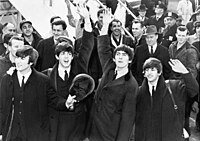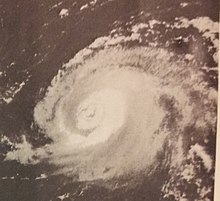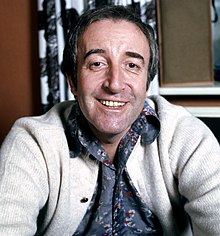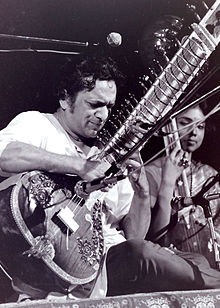Portal:1960s
The 1960s Portal
The 1960s became synonymous with the new, radical, and subversive events and trends of the period. In Africa the 1960s was a period of radical political change as 32 countries gained independence from their European colonial rulers. Some commentators have seen in this era a classical Jungian nightmare cycle, where a rigid culture, unable to contain the demands for greater individual freedom, broke free of the social constraints of the previous age through extreme deviation from the norm. Christopher Booker charts the rise, success, fall/nightmare and explosion in the London scene of the 1960s. However, this alone does not explain the mass nature of the phenomenon. Several nations such as the U.S., France, Germany and Britain turned to the left in the early and mid 1960s. In the United States, John F. Kennedy, a Keynesian and staunch anti-communist, pushed for social reforms. His assassination in 1963 was a stunning shock. Liberal reforms were finally passed under Lyndon B. Johnson including civil rights for African Americans and healthcare for the elderly and the poor. Despite his large-scale Great Society programs, Johnson was increasingly reviled by the New Left at home and abroad. The heavy-handed American role in the Vietnam War outraged student protestors across the globe, as they found peasant rebellion typified by Ho Chi Minh and Che Guevara more appealing. Italy formed its first left-of-center government in March 1962 with a coalition of Christian Democrats, Social Democrats, and moderate Republicans. Socialists joined the ruling block in December 1963. In Britain, the Labour Party gained power in 1964. In Brazil, João Goulart became president after Jânio Quadros resigned. This is a Featured article, which represents some of the best content on English Wikipedia..
The Brinks Hotel in Saigon, also known as the Brink Bachelor Officers Quarters (BOQ), was bombed by the Vietcong on the evening of 24 December 1964, during the Vietnam War. Two Vietcong operatives detonated a car bomb underneath the hotel, which housed United States Army officers. The explosion killed two Americans, an officer and an NCO, and injured approximately 60, including military personnel and Vietnamese civilians. The Vietcong commanders had planned the venture with two objectives in mind. Firstly, by attacking an American installation in the center of the heavily guarded capital, the Vietcong intended to demonstrate their ability to strike in South Vietnam should the United States decide to launch air raids against North Vietnam. Secondly, the bombing would demonstrate to the South Vietnamese that the Americans were vulnerable and could not be relied upon for protection. (Full article...) This is a Good article, an article that meets a core set of high editorial standards.
Hurricane Debbie was an intense and long-lived hurricane that formed during August 1969. The fifth tropical cyclone, fourth named storm, third hurricane and second major hurricane of the 1969 Atlantic hurricane season, Debbie formed on August 14 in the southern Atlantic Ocean and took a general northwesterly path until turning northward into the central Atlantic. The storm was characterized by numerous fluctuations in intensity, but it still reached winds corresponding to Category 3 status on the Saffir–Simpson scale. The hurricane bypassed the island of Bermuda to the southeast on August 22, before ultimately brushing southeastern Newfoundland with strong winds. It dissipated over the cold waters east of Greenland. Although Debbie had little effect on land, it was extensively researched and was subject to a weather modification experiment by Project Stormfury, in which it was seeded with silver iodide. (Full article...) Selected picture - Christine Keeler, best known for her involvement in the Profumo Affair, which lead to the resignation of British Prime Minister Harold Macmillan.
Did you know -
Related portalsThis is a Featured article, which represents some of the best content on English Wikipedia..
Peter Sellers (born Richard Henry Sellers; 8 September 1925 – 24 July 1980) was an English actor and comedian. He first came to prominence performing in the BBC Radio comedy series The Goon Show. Sellers featured on a number of hit comic songs, and became known to a worldwide audience through his many film roles, among them Chief Inspector Clouseau in The Pink Panther series. Born in Southsea, Sellers made his stage debut at the Kings Theatre, Southsea, when he was two weeks old. He began accompanying his parents in a variety act that toured the provincial theatres. He first worked as a drummer and toured around England as a member of the Entertainments National Service Association (ENSA). He developed his mimicry and improvisational skills during a spell in Ralph Reader's wartime Gang Show entertainment troupe, which toured Britain and the Far East. After the war, Sellers made his radio debut in ShowTime, and eventually became a regular performer on various BBC Radio shows. During the early 1950s, Sellers, along with Spike Milligan, Harry Secombe and Michael Bentine, took part in the successful radio series The Goon Show, which ended in 1960. (Full article...) This is a Good article, an article that meets a core set of high editorial standards.
Ravi Shankar (Bengali pronunciation: [ˈrobi ˈʃɔŋkor]; born Robindro Shaunkor Chowdhury, sometimes spelled as Rabindra Shankar Chowdhury; 7 April 1920 – 11 December 2012) was an Indian sitarist and composer. A sitar virtuoso, he became the world's best-known expert of Indian classical music (in Sitar) in the second half of the 20th century, and influenced many musicians in India and throughout the world. Shankar was awarded India's highest civilian honour, the Bharat Ratna, in 1999. He is also the father of American singer Norah Jones and British-American musician and sitar player Anoushka Shankar. Shankar was born to a Bengali family in India, and spent his youth as a dancer touring India and Europe with the dance group of his brother Uday Shankar. At age 18, he gave up dancing to pursue a career in music, studying the sitar for seven years under court musician Allauddin Khan. After finishing his studies in 1944, Shankar worked as a composer, creating the music for the Apu Trilogy by Satyajit Ray, and was music director of All India Radio, New Delhi, from 1949 to 1956. He was nominated for the Academy Award for Best Original Score for scoring the blockbuster Gandhi (1982). (Full article...) Selected article -Barry Morris Goldwater (January 2, 1909 – May 29, 1998) was an American politician and major general in the Air Force Reserve who served as a United States senator from 1953 to 1965 and 1969 to 1987, and was the Republican Party's nominee for president in 1964. Goldwater was born in Phoenix, Arizona, where he helped manage his family's department store. During World War II, he flew aircraft between the U.S. and India. After the war, Goldwater served in the Phoenix City Council. In 1952, he was elected to the U.S. Senate, where he rejected the legacy of the New Deal and, along with the conservative coalition, fought against the New Deal coalition. Goldwater also challenged his party's moderate to liberal wing on policy issues. He supported the Civil Rights Acts of 1957 and 1960 and the 24th Amendment to the U.S. Constitution but opposed the Civil Rights Act of 1964, disagreeing with Title II and Title VII. In the 1964 U.S. presidential election, Goldwater mobilized a large conservative constituency to win the Republican nomination, but then lost the general election to incumbent Democratic president Lyndon B. Johnson in a landslide. (Full article...) More Did you know (auto generated)
TopicsCategoriesWikiProjects
Associated WikimediaThe following Wikimedia Foundation sister projects provide more on this subject:
Discover Wikipedia using portals |































